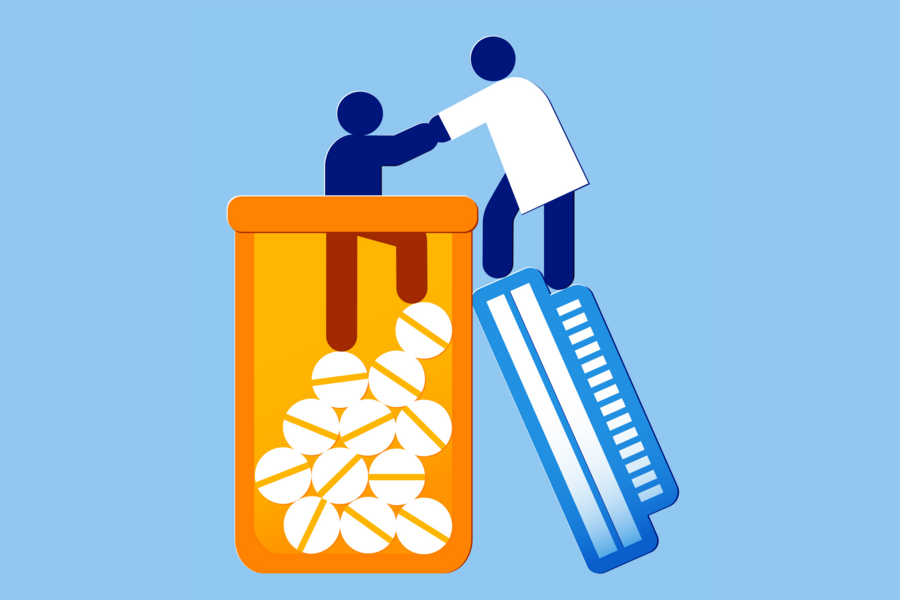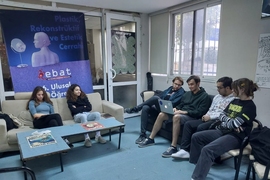Despite increased awareness and substantial media coverage, the addiction and overdose crisis continues across the United States. According to the 2021 National Survey on Drug Use and Health, 46.3 million people aged 12 or older had a substance use disorder (SUD). Among people aged 12 or older in 2021, only 4.1 million (or 1.5 percent) received any substance use treatment in the past year. Data from the Centers for Disease Control’s National Center for Health Statistics indicate there were nearly 107,000 drug overdose deaths in the United States during 2021, an increase of nearly 14 percent from the previous year. Opioids were involved in 75 percent of those drug overdose deaths.
A team from MIT Open Learning and Brown University has been awarded a grant from the National Institute on Drug Abuse (NIDA), part of the National Institutes of Health (NIH), to create a program to train SUD researchers in entrepreneurship and biomedical product development. The program’s main goal is to advance the inception and development of products and services to deliver effective prevention, diagnostic, and treatment solutions for people with substance use disorders.
“This NIH-funded program is an exciting opportunity to bridge the gap between the science of SUD and effective, market-ready solutions. We’re keen to bring Open Learning’s experience with developing targeted educational programs in innovation and entrepreneurship to bear on NIH’s work in steering biomedical innovations from lab to market,” says Cynthia Breazeal, dean for digital learning at MIT and principal investigator on the project. “SUD is a multidisciplinary challenge with huge personal and societal impacts — this is about saving lives. Our aim is to build a community of domain expert entrepreneurs pursuing innovative solutions to substance use disorders, and we’re so excited about the possibilities now that the work is underway.”
The project team also includes professors Sanjay Sarma and Eric von Hippel, Director of Experiential Learning Erdin Beshimov, Principal Research Scientist Aikaterini “Katerina” Bagiati, Research Scientist Andrés Felipe Salazar-Gómez, and Brown University Professor Carolina Haass-Koffler.
“Every time the NIH or another funding agency invests in research for a major health challenge, they assess the percentage of that investment that resulted in prevention, diagnostic, or treatment technologies entering the market,” says Salazar-Gómez. “For SUD, there continues to be a disconnect. Although new products and services have been developed, these have not made meaningful progress in reducing overdose deaths. New approaches are necessary.”
The research and development pipeline of pharmaceutical companies is lacking novel drugs that target the central nervous system as they require more time and expense from the bench to clinical setting than other drugs. A lot of pharmacological clinical trials instead focus on repurposed Food and Drug Administration-approved medications for different indications.
“Many novel drugs for SUD, while showing promise in preclinical models, have not translated to humans, both for safety concerns and lack of efficacy. Pharmacological targets for the development of medications to treat SUD are difficult to identify, not only because the activation and/or inhibition of multiple biological systems, but also because the constellation of the SUD endophenotype (including comorbidities) is extremely complex,” explains Haas-Koffler. “Evaluating relationships between peripheral and central activity is also very challenging to include in human laboratory studies. Therefore, advancing precision medicine approaches, developing biomarkers able to monitor drug response, and incorporating innovative technology require an interdisciplinary effort.”
Beyond the challenges and opportunities pharmacology offers, tackling SUD also requires the integration of psychosocial interventions, such as behavioral therapy and community support, and new technological advancements rooted in biomedical product development and financed through government funding, in the style of the NIH Blueprint MedTech initiative and the NIDA Small Business Innovation Research and Small Business Technology Transfer programs.
The MIT program and its academic research component started in summer 2022 and is anticipated to conclude in summer 2027. After the first year focusing on curriculum development, the remaining years will focus on training four, year-long cohorts of 15-30 fellows each. Training will include a combination of asynchronous and synchronous online modules and workshops — with a weeklong, in-person, hands-on boot camp on entrepreneurship and innovation for biomedical product development facilitated by experienced industry and academic coaches.
“We will be setting up a community of learners,” says Bagiati. “Beyond the development of the pedagogy, we need to consider all of the supporting mechanisms they will need.”
This effort is funded by NIDA through a cooperative agreement, and team members meet monthly to discuss progress and milestones. The team is currently reaching out to scholars to get a sense of their expectations, and will analyze these data to design the first round of the program. At the end of each academic year, the team will assess what needs to be improved for the next cohort.
“We are facing this challenge using an evidence-based lens, assessing successful stories of products and services for SUD prevention and treatment, and understanding from academia and industry what is needed to better serve the community that so desperately needs solutions to this epidemic,” says Breazeal.
The program and its research are supported by the National Institute on Drug Abuse of the National Institutes of Health under Award Number UE5DA056914. This award is subject to the Cooperative Agreement Terms and Conditions of Award as set forth in RFA DA-22-020, entitled "Growing Great Ideas: Research Education Course in Product Development and Entrepreneurship for Life Science Researchers (UE5 Clinical Trial Not Allowed)."
The content of this publication is solely the responsibility of the authors and does not necessarily represent the official views of the National Institutes of Health.










